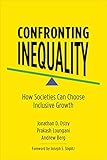Confronting Inequality : How Societies Can Choose Inclusive Growth / Prakash Loungani, Andrew Berg, Jonathan D. Ostry.
Material type: TextPublisher: New York, NY : Columbia University Press, [2019]Copyright date: ©2018Description: 1 online resource : 51 graphs and chartsContent type:
TextPublisher: New York, NY : Columbia University Press, [2019]Copyright date: ©2018Description: 1 online resource : 51 graphs and chartsContent type: - 9780231174695
- 9780231527613
- 339.2 23
- HC79.I5
- online - DeGruyter
- Issued also in print.
| Item type | Current library | Call number | URL | Status | Notes | Barcode | |
|---|---|---|---|---|---|---|---|
 eBook
eBook
|
Biblioteca "Angelicum" Pont. Univ. S.Tommaso d'Aquino Nuvola online | online - DeGruyter (Browse shelf(Opens below)) | Online access | Not for loan (Accesso limitato) | Accesso per gli utenti autorizzati / Access for authorized users | (dgr)9780231527613 |
Frontmatter -- CONTENTS -- FOREWORD -- PREFACE -- 1. INTRODUCTION -- 2. INEQUALITY: MEASURES AND DRIVERS -- 3. INEQUALITY AND SUSTAINED GROWTH -- 4. STRUCTURAL POLICIES AND INEQUALITY -- 5. FINANCIAL GLOBALIZATION AND INEQUALITY -- 6. AUSTERITY AND INEQUALITY -- 7. CENTRAL BANKS AND INEQUALITY -- 8. TECHNOLOGY, ROBOTS, AND INEQUALITY -- 9. REMEDIES FOR INEQUALITY-REDISTRIBUTION -- 10. CONCLUSIONS -- DATA APPENDIX -- TECHNICAL APPENDIX -- GLOSSARY -- REFERENCES -- INDEX
restricted access online access with authorization star
http://purl.org/coar/access_right/c_16ec
Inequality has drastically increased in many countries around the globe over the past three decades. The widening gap between the very rich and everyone else is often portrayed as an unexpected outcome or as the tradeoff we must accept to achieve economic growth. In this book, three International Monetary Fund economists show that this increase in inequality has in fact been a political choice-and explain what policies we should choose instead to achieve a more inclusive economy.Jonathan D. Ostry, Prakash Loungani, and Andrew Berg demonstrate that the extent of inequality depends on the policies governments choose-such as whether to let capital move unhindered across national boundaries, how much austerity to impose, and how much to deregulate markets. While these policies do often confer growth benefits, they have also been responsible for much of the increase in inequality. The book also shows that inequality leads to weaker economic performance and proposes alternative policies capable of delivering more inclusive growth. In addition to improving access to health care and quality education, they call for redistribution from the rich to the poor and present evidence showing that redistribution does not hurt growth. Accessible to scholars across disciplines as well as to students and policy makers, Confronting Inequality is a rigorous and empirically rich book that is crucial for a time when many fear a new Gilded Age.
Issued also in print.
Mode of access: Internet via World Wide Web.
In English.
Description based on online resource; title from PDF title page (publisher's Web site, viewed 02. Mrz 2022)


